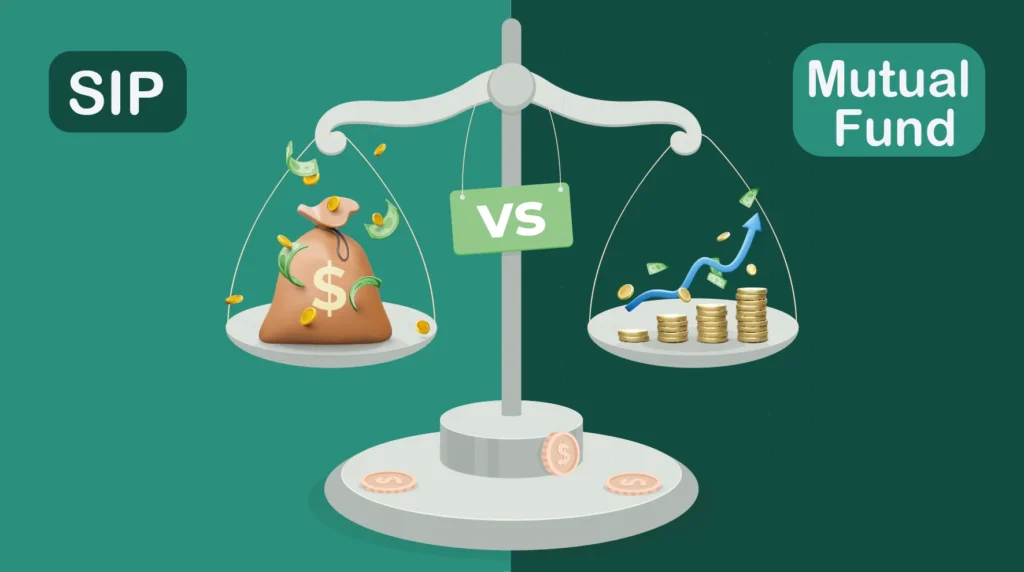Investors are constantly looking for better investing opportunities. The market offers a variety of choices, including hedge funds, Systematic Withdrawal Plans (SWP), Unit Linked Insurance Plans (ULIP), Equity Linked Saving Schemes (ELSS), and many more. Most investors want to boost their returns without the burden of tracking their portfolios and trading in the market. As a result, several types of investment now employ fund managers to trade on behalf of investors, saving them time.

Both mutual funds and SIPs invest in the stock market, but there are some distinctions between them. In this essay we discuss Sip or Mutual funds which is Better?
Diffrent Between Sip or Mutual funds?
1. Matual Fund:
A mutual fund is a type of investment in which an authorized fund house, such as banks and asset management businesses, gathers money from investors and trades in securities on their behalf, hoping to maximize the profit ratio while minimizing risk.

The risk of market movement is decreased because the funds are invested in various assets with varying investment horizons. When risk is decreased, a loss in one asset is compensated by a gain in another item in the portfolio.
Individual investors’ portfolios consist of shares, bonds, and commodities. This portfolio is overseen by a finance manager, also known as a fund manager.
Mutual funds are one of the safest types of investments because they are made in lump sums. Various mutual funds seek to attain specific goals, such as small-cap, mid-cap, and large-cap funds, index funds, and so on.
2. Systematic Investment Plan (SIP):
is similar to a mutual fund, however lump sum investments are more common with mutual funds. In contrast, SIPs involve a little amount of money being put in the fund on a regular basis.

You can invest a minimum of Rs 500 every month or quarterly. A fund manager is assigned to invest on behalf of investors in various markets, such as stocks, bonds, and commodities. The goal of the fund manager is to maximize profit while minimizing risk to a minimum.
One of the primary advantages of investing in SIP is the power of compounding, which involves reinvesting the interest gained on the principal value. Over time, investors get a bigger profit.
Sip or Mutual funds which is Better:
Let us find out the Sip or Mutual funds which is Better in detail here-

- Investment Value:
Mutual fund investments are made in one lump payment, whereas SIP investments are made in smaller, recurring amounts on a monthly or quarterly basis.
- The Volatility of the Market:
The market is continually swinging between bearish and bullish trends. These ever-changing market patterns have a stronger impact on mutual funds than on SIP, because mutual funds have a higher investment value than SIP.
- Charges:
Mutual funds have a greater AMC (Annual Maintenance Charge) and other charges, such as transaction costs, than SIPs because their investment value is higher.
The costs associated with the fund manager’s fees and the transaction value are higher in mutual funds than they are in SIPs, where the trade value and the investment value are always lower.
- Redemption:
Mutual funds and SIPs are examples of extremely liquid investment vehicles. The redemption fees for mutual funds are somewhat greater than those for SIPs, but that is the only distinction.
An investment vehicle that gives you exposure to stocks, bonds, and other financial instruments is a mutual fund. Even so, a SIP is a tool for mutual fund investing. SIP and mutual funds are two entirely distinct ideas, so comparing them is like comparing apples and oranges.
Related question:
SIP or Mutual funds which is better
What is mutual fund and sip sbi
SIP vs mutual fund calculator
What is SIP
Sip or mutual funds which is better in india
Sip or Mutual funds Takeaways:
- SIP and mutual funds are vulnerable to market risk.
- SIPs are regular investments, whereas mutual funds are lump sum investments.
- Mutual fund investments are on the upper end, whilst SIP investments are on the lower end.
Conclusion:
Mutual funds and SIPs are complementing rather than antagonistic. Mutual fund investments can be made through SIPs, which are best suited for consistent, disciplined investment. Conversely, mutual funds are the real investment product, providing a variety of choices to meet various investment requirements.
Your decision between the two will be based on your financial objectives, risk tolerance, investment horizon, and whether you have a lump sum or prefer ongoing investing. Understanding these distinctions is critical to making sound investing decisions that match with your financial goals.











